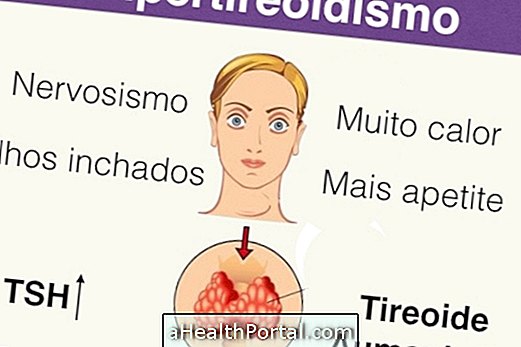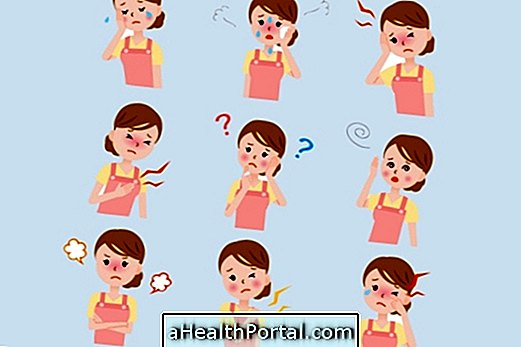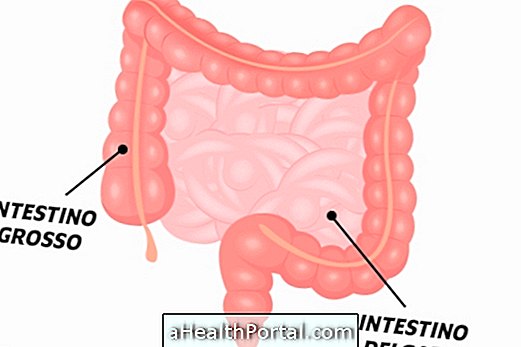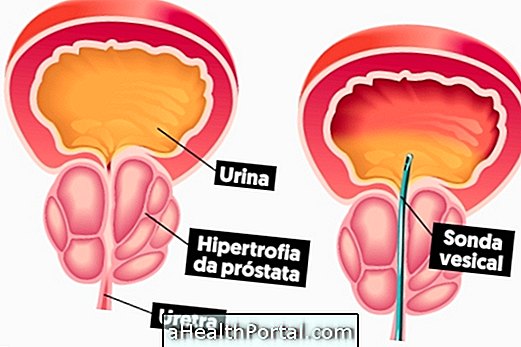Hyperthyroidism is characterized by overproduction of thyroid hormones, which can be caused by changes in the immune system, taking medications to control hypothyroidism, inflammation of the thyroid, or nodules such as the adenoma, which is more common in the elderly.
The most common cause of hyperthyroidism is Graves' Disease, an autoimmune disease, which occurs when the body itself produces antibodies against the thyroid. Women who have hyperthyroidism due to Graves' Disease may have babies who are also born with hyperthyroidism.

Signals and symptons
In hyperthyroidism, regardless of its cause, all organic functions accelerate, developing symptoms such as:
- Anxiety, nervousness, irritability;
- Swelling around the eyes;
- Increased production of tears;
- Ocular changes;
- Unusual sensitivity to light;
- Heart palpitations;
- Increased blood pressure;
- Feeling of heat even in a cold environment and heat intolerance;
- Increased skin moisture;
- Tremors in the hands;
- Excessive sweating;
- Frequent tiredness;
- Weakness;
- Increased appetite with weight loss or slight weight gain;
- Insomnia;
- Diarrhea or increased frequency of defecations;
- Menstrual changes;
- Increased breasts in men;
- Reddish coloration on the palms of the hands;
- Swollen legs and feet.
In the elderly the symptoms are slightly different with the presence of weakness, rapid heartbeat, shortness of breath and swelling throughout the body.
Subclinical hyperthyroidism
Subclinical hyperthyroidism The signs and symptoms may not be present or are so subtle that the doctor does not distrust the thyroid. This change can be diagnosed through a blood test that shows low TSH, less than 0.1 microU / mL while T3 and T4 are normal.
In this case, the individual should perform new tests within 2 to 6 months to check the need for medication, because normally no treatment is necessary, and the treatment is only reserved for symptoms.
Hyperthyroidism in Pregnancy
The increase of thyroid hormones in pregnancy can cause complications such as eclampsia, miscarriage, preterm birth, low birth weight in addition to heart failure in women.
Women who had normal values before becoming pregnant and who were diagnosed with hyperthyroidism from the very beginning to the end of the first trimester of pregnancy usually do not need to perform any type of treatment because a slight increase in T3 and T4 during pregnancy is normal. However, your doctor may prescribe medications to normalize T4 in the blood without damaging the baby.
The dose of the drug varies from person to person and the first dose indicated by the obstetrician is not always maintained during treatment because the dose may need to be adjusted after 6 to 8 weeks after the start of the medication. Learn more details by clicking here.
How to know if it is hyperthyroidism
For the diagnosis of hyperthyroidism, the presence of signs and symptoms should be observed, and it is very important to perform blood tests that indicate the functioning of the thyroid:
- T3;
- T4;
- TSH.
These tests should be performed every 5 years from the age of 35, especially in women, but people who are at higher risk of developing the disease should perform this test every 2 years.
People who are more likely to have hyperthyroidism are women with thyroid problems, goiter, who use medications such as amiodarone, cytokines, and iodine-containing compounds or have diseases such as myasthenia gravis, type 1 diabetes, and primary adrenal insufficiency.
Treatment
Treatment for hyperthyroidism can be done by taking medications such as Propylthiouracil and Methimazole, by using radioactive iodine or by removing the thyroid through surgery.
The choice of treatment will depend on the age of the person, the symptoms presented and whether it is possible to regulate thyroid function only with medicines or not. Removal of the thyroid is only indicated in the latter case when the symptoms do not disappear and it is not possible to regulate the thyroid by changing the dose of the remedies. See how each type of treatment can be done by clicking here and know the most appropriate home remedies and how the food can help in the following video.




















